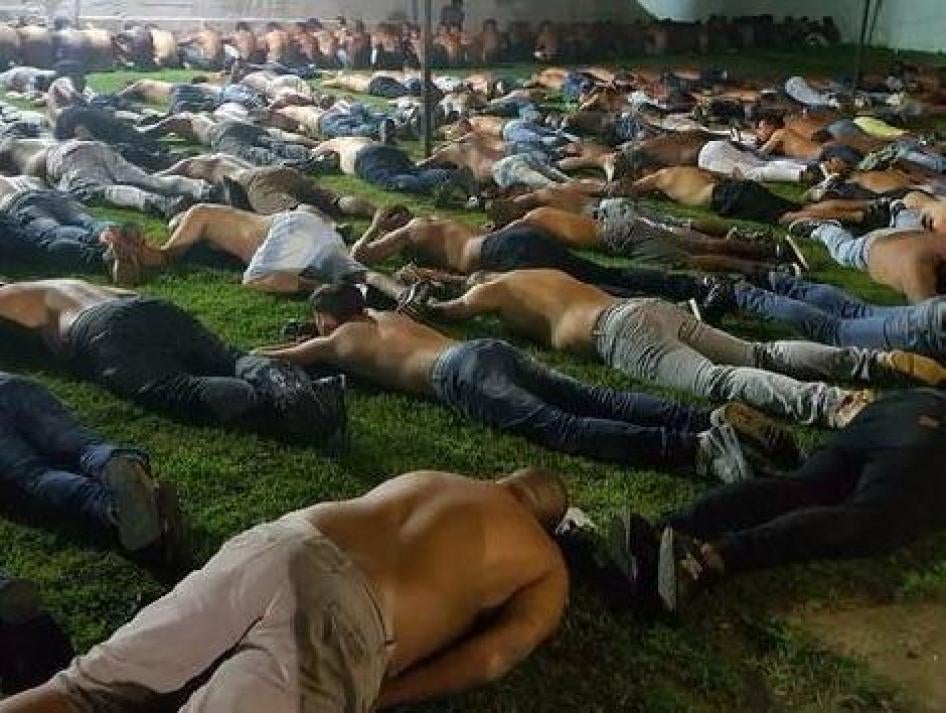Hundreds of people attending a party at a house rented for the occasion in Rio de Janeiro on April 7 were dancing to pagode –a pop variation of samba– when they heard shots.
About 40 police officers stormed the house, and four armed guards responded by opening fire on them, police reports and judicial documents allege. Police killed them; no police officers were shot.
What ensued in the next hours and days reveals the need for judges to ensure detentions are lawful, and the perils when that review is not done right. A bill before Congress to require this review needs modifications to guarantee that happens.
Police said the house, Sitio Três Irmãos, was “the headquarters” of a militia –a criminal group originally run by active and retired law enforcement personnel that extorts payments from residents and businesses for protection and services– and that its leaders organized the party.
Police reported finding stolen cars, a grenade, 28 firearms, and more than 1,000 rounds of ammunition at the scene. They let the women, the band members, and wait staff go –about 300 people in all– and detained 159 men, including four members of the armed forces and eight children. Prosecutors found no evidence against the children, and a judge freed them two days later.
Under international law, anyone detained has the right to see a judge promptly. In that hearing --called a “custody hearing” in Brazil— the judge determines if there is evidence that the person committed a crime. If so, the judge determines whether the detainee needs to await trial in jail because they are a flight risk, can tamper with evidence or threaten witnesses, is a threat to “public order” or the national “economic order,” or has already violated probation rules. Otherwise, the detainee should be freed. The judge should also examine detainees for evidence of mistreatment.
In the case of the men detained on April 7, the court ordered the use of videoconferencing to hold these hearings, for security reasons. A public defender petitioned to hold the hearings in the jail instead of using videoconferencing, but a judge rejected the request, citing logistical difficulties.
On April 11, more than 70 hours after arrest, detainees were finally able to see a judge, through videolink. The judge held the hearings for groups of about 20 detainees at a time.
The defense contended that the party was advertised on social media and the radio and that the men had paid to enter and were given paper bracelets as tickets. The police said in their report that “any good person” would turn around when they saw the armed guards at the door. Because the men entered the party, the police argued, “they willingly adhered to the behavior of the criminals.”
Police provided no evidence about the crime that each of the detainees allegedly committed. Neither have they said who had possession of the guns found at the party. Instead, the chief investigator asserted in his final report that the weapons were “among the detainees” and they “shared possession” of the guns.
At the custody hearings, the judge said that no individualized evidence of a crime is needed, and in a single decision, she ordered all detainees held until trial for belonging to a criminal organization and illegal possession of weapons.
The judge noted in her decision that 112 of the 159 detainees --more than 70 percent-- said at the hearing that police officers beat them, but the judge did not record the details of the alleged mistreatment. She said she would not send the allegations of mistreatment to prosecutors for investigation because the detainees could not identify the officers who they said beat them. A public defender told Human Rights Watch that police had their faces covered and had no visible identification.
So while the judge said that individualized proof is not needed to keep someone detained, she insisted that it is needed to investigate alleged police abuses. Following this logic, all police officers would need to do to avoid prosecution is to cover their faces before abusing detainees.
Police can raid a party if they have evidence of a crime, but it is absurd for them to assume without evidence that every reveler is a criminal.
After the hearings, police admitted in a report requested by a different judge who is examining habeas corpus petitions that 139 of the 159 men had no criminal record and were not being investigated prior to the raid, and that there was no public or intelligence information that suggested their involvement with criminal activities.
Custody hearings are intended as a check on police powers. To meet international legal standards, judges need to conduct them in person, not through a videoconference, and to examine the evidence against each defendant and to make a decision about pretrial detention individually. And except in extraordinary circumstances, such as an arrest in a very remote area, these hearings should be held within 48 hours of arrest.
Custody hearings are also a critical safeguard against ill-treatment of detainees, but only if allegations of abuse are investigated.
The much-needed bill before Congress to guarantee the right to a custody hearing specifies various situations in which the hearings could be by videoconference and could be held as long as five days after a person is arrested. Legislators should change those provisions before the vote to adequately protect the rights of detainees, and to make sure the hearings serve their intended purpose.
On April 19, a judge released one of the 159 detainees, a 23-year-old circus artist who lives abroad most of the time.
The rest remain in a jail assigned to hold members of the militia, where they are at risk of being targeted for recruitment into gangs. Those who have jobs may lose them, and their families will suffer. At least four of the remaining 158 detainees, the public defender says, live in poor neighborhoods controlled by rival criminal groups. At least some will probably be in danger if they return.
Attending a party guarded by heavily armed men may show poor judgment, but it is not a crime. A proper hearing would result in detaining only those who face a real charge and truly need to be behind bars, and would free the pagode fans who only went there to dance.










